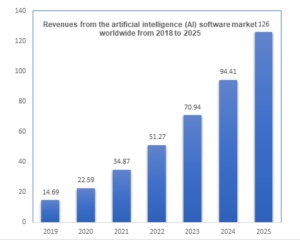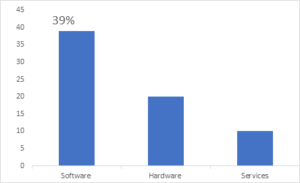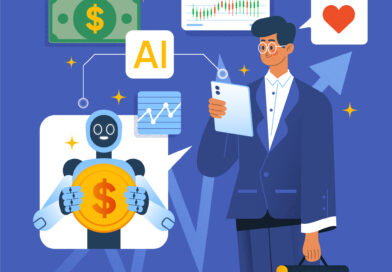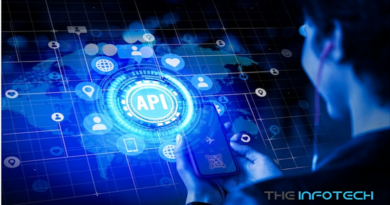Artificial Intelligence Market Size, Share & Trends Analysis
Report overview
The global artificial intelligence market was worth USD 93.5 billion in 2021, and it i
s expected to increase at a 38.1 percent compound annual growth rate (CAGR) from 2022 to
2030. The adoption of advanced technologies in industry verticals such as automotive, healthcare, retail, finance, and manufacturin
g is being driven by the tech giants’ continual research and innovation. However, technology has always been an important part of many businesses, but AI has pushed techn
ology to the forefront.
The adoption of artificial intelligence technology by biopharmaceutical businesses in various applications suc
h as research, drug discovery, and clinical trials is considerably boosting the need for artificial intelligence technology around the world. The AI market is rising as improved digital technologies become more widely
used in numerous applications around the world. The ability of AI technology to self-learn from the data and knowledge it s
tores is believed to be its most important characteristic.
Artificial Intelligence Market Report
Report Highlights
- In 2021, the software category lead the worldwide AI market in terms of solution. The adoption of advanced software technologies has been spurred by the growing applications of voice, image, and text recognition. The market is being fueled by increased investments in the upgrade and development of new AI-based software capabilities.
- In terms of technology, the deep learning category dominated the industry with a market share of roughly 38 percent in 2021. Deep learning technology is used to manage and store large amounts of complicated data and information, which is a critical requirement for modern enterprises.
During the forecast period, the healthcare segment is expected to become the leading segment by end user. This is due to the rising use of artificial intelligence (AI) in robot-assisted surgeries, diagnosis, and patient monitoring. Furthermore, the increasing use of telehealth is driving up demand for AI in the healthcare industry.

Technology Insights
Deep learning was the top segment in terms of technology, with a market share of roughly 38 percent in 2021. This dominance can be attributed to its sophisticated data-driven applications, such as audio, video, and text recognition. The increasing technical breakthroughs in the field of deep learning are expected to solve the problems connected with large amounts of data. Furthermore, the increasing adoption of deep learning technology in the medical field is expected to boost the segment’s growth over the forecast period.
Machine learning’s large percentage of overall AI investments is fueling its use in a variety of applications such as hypothesis generation, clustering, modifying, tagging, clustering, filtering, visualization, and navigation, promoting the development of cognitive solutions. The emergence of data analytics platforms has been aided by the increasing use of on-premises hardware and cloud computing platforms for managing and storing large volumes of data. The AI market is projected to rise in the near future as leading IT companies increase their efforts in innovation and research.
Solution Insights
In 2021, the software segment accounted for nearly 39% of total sales. The software component of the AI market is being driven by advancements in data storage systems, parallel processing, and increased computing power. The segment’s growth is being fueled by increased demand for software technologies such as linear algebra, video analytics, hardware communication capacity, inference, and sparse matrices used in the deployment and design of AI applications. The growing demand for software solutions in the global artificial intelligence market is expected to be fueled by businesses’ desire to obtain meaningful data and information through visual content analysis.

During the projected period, the fastest-growing segment is expected to be hardware. CPU, GPU, ASIC, and FPGA are some of the artificial intelligence hardware components. The massive demand for CPUs and GPUs due to their great computing capability has resulted in their domination in the hardware industry. In the future years, increased adoption of AI technology across many end-use sectors is likely to enhance demand for artificial intelligence hardware systems.
You May Like

Transforming the Workplace: The Impact of Salesforce and Workday’s AI Alliance on the Future of Work
Salesforce and Workday have announced a strategic partnership that aims to reimagine enterprise software with advanced AI capabilities and unified data integration. This

Nauto aims to protect distracted drivers with in-vehicle AI cameras pointing insid
Nauto, a company with AI-powered safety cameras, has created a way for commercial fleet operators and others to capture problems

By embracing liquid cooling, AI powerhouse Supermicro enables 30% more computing power with the same power budget
Charles Liang, CEO of Supermicro, predicts that “the AI revolution can be bigger than the industrial revolution,” and the astonishing

HIX.AI Announces Major Product Pivot to AI Search Engine, Rivaling Perplexity
SINGAPORE, July 15, 2024 /PRNewswire/ — HIX.AI, a leading innovative solution provider in the artificial intelligence field, today announced a fundamental shift






